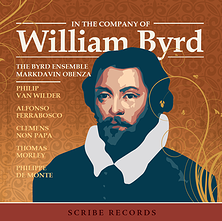In review--Soaring song byrd
The Byrd Ensemble
Markdavin Obenza
In the Company of
William Byrd
Scribe Records
Seattle has for several decades acted as a hotbed for music
communities, including an early music community that began in the 1970s. These days, Seattle’s early music community
features a few of the founders of the early music scene as well as, newcomers
such the Tudor Choir, Renaissance Singers and The Byrd Ensemble, named after
renaissance church music composer William Byrd.
On the ensemble’s latest recording, In
the Company of William Byrd the singers explore the music of Byrd’s
contemporaries and mentors who hail mostly from the European mainland.
Here we have a lush recording of renaissance polyphonic singing exploring the sacred works of Philip van Wilder, a Flemish lutenist, Alfonso Ferrabosco, an Italian composer, Clemens non Papa (also covered by the Tudor Choir in a 2006 recording), Thomas Morley (English composer), and rounding off the Byrd’s company on the CD, Philippe de Monte. The singers alternate between Byrd’s contemporaries and Byrd’s compositions. I’m not sure if this arrangement is supposed to show contrast and comparisons or highlight the composers who influenced Byrd’s compositions. In either case, we are treated to crystalline sopranos and glorious voices throughout the vocal spectrum.
I have listened to numerous renaissance polyphonic recordings since writing an article on the topic in 2006 and In the Company of William Byrd certainly holds its own with the international recordings I’ve reviewed over the years. In fact, both I and the songbirds in the tree outside have enjoyed this recording immensely since the first listening session. I’m now listening to the recording a second time through headphones and I can easily imagine myself sitting in a cathedral with these voices cascading off a vaulted ceiling and sacred walls.
The
chant currently playing, Tristitia et
anxietas enchants my senses with the balance of voices running right up the
chakras. Kudos to the singers and
arrangers for their hard work, passion for early music and for sharing their
vocal talent in this format. After all,
with their talent, these vocalists could easily lend their voices to any
genre. I’m glad they chose early music.




Comments
Post a Comment